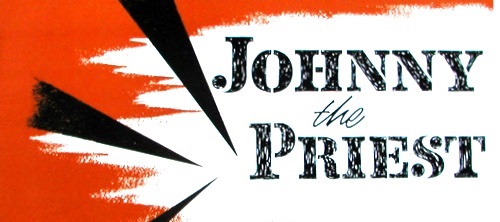One of the most fascinating of 'real-life' British musicals, JOHNNY THE PRIEST told the story of a young vicar's attempt to improve the lives of teenagers living in a run-down London dockland. Acknowledged as one of the most innovative and inventive scores of the period, this terrific score with its superb big band arrangements by Gordon Langford emerges refreshened in Alan Bunting's immaculate sound restoration. Antony Hopkins' remarkable score catapulted the British musical into new territory, offering not only the best songs ever about ping-pong and wallpaper, but moments of great beauty.
The most striking feature in the new musical presented by Don Gemmell and Reginald Woolley for Players Ventures Ltd., is the settings designed by Mr Woolley. They convey a feeling of realism and authenticity lacking in the show, are ingenious and pleasant to look at, and one can study them when what is happening in front of them becomes too unbearable.
R. C. Sheriff's play The Telescope was a serious, not uninteresting little play dealing with the tribulations of a young priest in Maybury, a dockland district in the East End of London, and with his struggle to lead a young delinquent into a better way of life. This musical version lays bare the shallowness and weakness of the play, and shows again the dangers of transferring a work from one medium to another.
Johnny the Priest is an uncomfortable mixture between realism in the West Side Story vein and melodrama of the more mawkish Victorian kind. The direction by Norman Marshall is excellent in the scenes with the lolling idle teenagers. The air of tension and violence is well created and the stage is filled with movement, no mean feat when one realises that there is virtually no dancing in this show. Collectively the youngsters engaged to portray these tough dockland loafers are rather deficient in talent and their idea of singing tends to be a strident shout, but Mr Marshall manoeuvres them so skilfully that the ten or so choruses involving them become visually among the best things in the evening.
The adaptation and lyrics are by Peter Powell and though some of the lyrics are in themselves good, one does wish that he could have refrained from making the Rev. Richard Highfield sermonise so often in song. One couldn't help feeling sorry for Jeremy Brett (Rev. Highfield) and Stephanie Voss, as his wife, Mary, for being made to sing such maudlin stuff.
The music by Antony Hopkins, though not inspiring, is tuneful and pleasant to listen to. 'The Foggy Foggy Blues' for instance is quite haunting and 'Vicarage Tea' is amusingly conceived.
Jeremy Brett is to be congratulated on his performance as the noble clean-limbed young Vicar who tries to fight boredom in the young with old volumes of Punch, ping-pong and boxing gloves. One shudders to think what the part would have been like in less capable hands. As it is he managed to retain sympathy and was even touching in his final dilemma and defeat.
Stephanie Voss has a strong, pleasant voice and she too did all she could within the limits of her role, as did Bunny May in the part of Johnny, the Vicar's protégé. His weedy gangling appearance looked just right and he conveyed with understanding the conflicts and tragic lack of confidence of a youngster trying to extract himself from the rut of his circumstances.
- L.M., from Theatre World issue of May 1960
